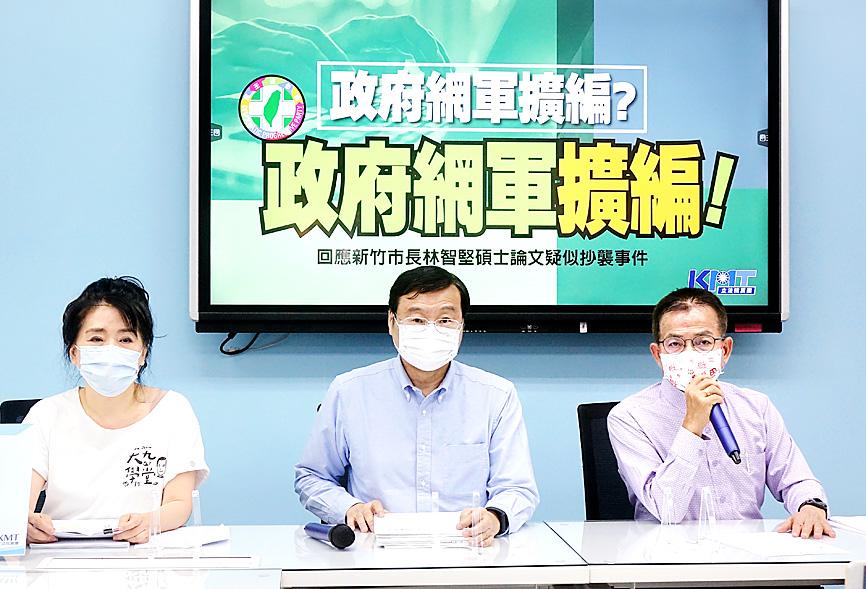The National Communications Commission’s (NCC) draft digital services act is an attempt to control freedom of expression and would make the free, democratic Republic of China an autocratic state, the Chinese Nationalist Party (KMT) said yesterday.
The draft act, which the council approved last week, would impose levels of obligations on five categories of large online platforms.
It would also establish special provisions for platforms that have more than 2.3 million domestic users — which would include YouTube, Facebook, Yahoo Auctions and DCard — with contraventions of the rules to draw fines of up to NT$10 million (US$335,965).

Photo: Chu Pei-hsiang, Taipei Times
However, KMT lawmakers accused the NCC of losing sight of its purpose.
KMT caucus convener William Tseng (曾銘宗) said that since Chen Yaw-shyang (陳耀祥) became NCC chairman, the “supposedly independent organization has become an affiliate organization of the Democratic Progressive Party.”
KMT Legislator Lee Kui-min (李貴敏) said that the draft act was, in effect, a government plan to control freedom of expression.
The NCC’s record — from denying a CTi News license renewal to fining Chinese Television System — shows that it is no longer acting in a neutral and independent capacity, Lee said.
While the draft act says that any oversight or investigative measures taken against digital media must receive judicial approval, the clause allowing the council to demand that platforms add a 30-day “warning label” to potentially offending posts — which would include whistle-blower accounts — before a court ruling is an overreach of the administrative branch, she said.
“While Taiwan has separation of five powers, in spirit, it has separation of three powers — the administrative branch cannot supersede the judiciary or the legislative branches,” she said.
The draft act’s main purpose is to empower the government to demand digital providers remove posts that the government considers to be “untrue” once a court ruling has ratified the accusation, KMT Legislator Lai Shyh-bao (賴士葆) said.
This would allow the government to control any Internet platform that has a market share of more that 10 percent, which no democratic and free country should do, Lai said.
It is sad that Taiwan would willingly follow in the footsteps of communist autocratic states, he said, adding that it would become a quasi-communist state with such a law on the books.
Lai panned a clause that would authorize the NCC to donate NT$2.5 billion (US$83.99 million) to create a non-department public body tasked with policing false information.
This is an obvious ploy to create an agency that empowers Internet users to propagate pro-government news and statements, he said.

Chinese Nationalist Party (KMT) Chairman Eric Chu (朱立倫), spokeswoman Yang Chih-yu (楊智伃) and Legislator Hsieh Lung-chieh (謝龍介) would be summoned by police for questioning for leading an illegal assembly on Thursday evening last week, Minister of the Interior Liu Shyh-fang (劉世芳) said today. The three KMT officials led an assembly outside the Taipei City Prosecutors’ Office, a restricted area where public assembly is not allowed, protesting the questioning of several KMT staff and searches of KMT headquarters and offices in a recall petition forgery case. Chu, Yang and Hsieh are all suspected of contravening the Assembly and Parade Act (集會遊行法) by holding

PRAISE: Japanese visitor Takashi Kubota said the Taiwanese temple architecture images showcased in the AI Art Gallery were the most impressive displays he saw Taiwan does not have an official pavilion at the World Expo in Osaka, Japan, because of its diplomatic predicament, but the government-backed Tech World pavilion is drawing interest with its unique recreations of works by Taiwanese artists. The pavilion features an artificial intelligence (AI)-based art gallery showcasing works of famous Taiwanese artists from the Japanese colonial period using innovative technologies. Among its main simulated displays are Eastern gouache paintings by Chen Chin (陳進), Lin Yu-shan (林玉山) and Kuo Hsueh-hu (郭雪湖), who were the three young Taiwanese painters selected for the East Asian Painting exhibition in 1927. Gouache is a water-based

Taiwan would welcome the return of Honduras as a diplomatic ally if its next president decides to make such a move, Minister of Foreign Affairs Lin Chia-lung (林佳龍) said yesterday. “Of course, we would welcome Honduras if they want to restore diplomatic ties with Taiwan after their elections,” Lin said at a meeting of the legislature’s Foreign Affairs and National Defense Committee, when asked to comment on statements made by two of the three Honduran presidential candidates during the presidential campaign in the Central American country. Taiwan is paying close attention to the region as a whole in the wake of a

OFF-TARGET: More than 30,000 participants were expected to take part in the Games next month, but only 6,550 foreign and 19,400 Taiwanese athletes have registered Taipei city councilors yesterday blasted the organizers of next month’s World Masters Games over sudden timetable and venue changes, which they said have caused thousands of participants to back out of the international sporting event, among other organizational issues. They also cited visa delays and political interference by China as reasons many foreign athletes are requesting refunds for the event, to be held from May 17 to 30. Jointly organized by the Taipei and New Taipei City governments, the games have been rocked by numerous controversies since preparations began in 2020. Taipei City Councilor Lin Yen-feng (林延鳳) said yesterday that new measures by